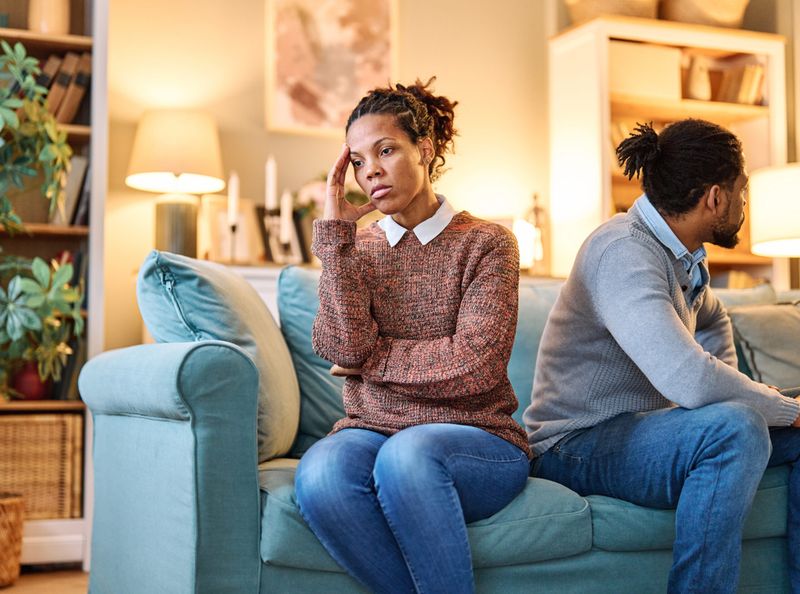16 Behaviors Of Couples Who Are Destined To Grow Old Lonely And Miserable
Relationships are delicate ecosystems that thrive on connection, understanding, and mutual respect. However, certain behaviors, often unintentional, can slowly erode these foundations.
This blog post explores 16 subtle patterns that, if left unchecked, may lead couples to grow old lonely and miserable. It’s not about blame—it’s about awareness and change.
By identifying these behaviors, couples can take proactive steps to nurture their connection and prevent the slow drift apart.
1. They stop asking each other real questions

In the hustle and bustle of daily life, it’s easy to let genuine curiosity about each other fall by the wayside. Couples who stop asking real questions often find themselves stuck in surface-level conversations, missing out on the depth that once connected them.
It’s not about grilling each other; it’s about maintaining a sense of wonder and wanting to know more about your partner’s evolving thoughts and feelings. When partners substitute real questions with assumptions, they miss the opportunity to truly understand each other.
This silent gap grows, leading to a disconnect where one partner feels unseen and unheard. A simple, heartfelt “How was your day?” can be the difference between feeling valued or ignored. Couples who thrive ask questions that matter, keeping their connection alive.
2. They keep score instead of keeping grace

Some couples turn their relationship into a tally of who’s right and who’s wrong, fostering resentment rather than understanding. Keeping score may seem like a way to ensure fairness, but it actually corrodes trust and intimacy.
Instead of being partners, they become adversaries, each waiting for the next slip-up to add to their mental ledger. This behavior fosters an environment of competition rather than collaboration.
Forgiveness and grace are crucial in maintaining a healthy relationship. Recognizing that everyone makes mistakes, and choosing to move forward together, strengthens the bond. Couples destined for happiness focus on building each other up rather than tearing each other down.
3. They vent to everyone but each other

When couples choose to air grievances to friends and family instead of each other, they create emotional distance. Venting outside the relationship can feel like a betrayal, as it exposes private concerns to those who may not have the full context.
This behavior not only undermines trust but also prevents couples from addressing issues head-on. It fosters a cycle of gossip and misunderstanding, leaving problems unresolved.
Open communication is the bedrock of a strong relationship. Discussing issues directly with a partner ensures that they are resolved collaboratively, fostering mutual respect and understanding. Couples who communicate openly find themselves more connected, rather than divided by unspoken resentments.
4. They dismiss small complaints until they become big resentments

Ignoring minor grievances might seem harmless, but over time, these small issues can snowball into major resentments. Couples who dismiss each other’s concerns, no matter how trivial they seem, risk fostering an environment of neglect and misunderstanding.
What starts as a slight annoyance can grow into a larger conflict if not addressed. Listening and addressing small complaints shows respect and empathy, preventing the buildup of larger issues.
By acknowledging and discussing these small challenges, couples can prevent the cracks in their relationship from widening into chasms. Embracing open dialogue allows for a healthier, more resilient partnership.
5. They prioritize being right over being close

In some relationships, the need to be right eclipses the desire to be close. Couples who prioritize winning arguments over understanding each other often find themselves in a cycle of conflict and isolation.
Being right can feel gratifying in the moment, but it comes at the cost of intimacy and connection. It’s important to remember that being in a relationship means being a team, not opponents.
Choosing to understand rather than to be right fosters a supportive environment where both partners feel valued. Couples who embrace compromise and empathy often find themselves more connected and aligned.
6. They use sarcasm as a defense

Sarcasm can be a sneaky form of communication, masking true feelings behind a veil of humor. While it might offer a momentary shield, it often leaves partners feeling misunderstood and belittled.
When sarcasm becomes a default response, it erodes trust and can create a hostile environment. Instead of expressing genuine thoughts and emotions, partners hide behind sarcasm, leading to further disconnect.
Embracing honest communication, free from defensive sarcasm, allows couples to build a more supportive and understanding relationship. Authenticity fosters trust, paving the way for a deeper emotional connection.
7. They expect the other person to “just know”

Assuming a partner can read your mind is a common misconception that leads to misunderstandings. Couples who rely on unspoken expectations often find themselves disappointed when these assumptions go unmet.
Expecting a partner to “just know” what you need disregards the importance of clear communication. It creates a cycle of unmet expectations and growing discontent.
Expressing needs and desires openly allows both partners to understand and support each other better. Clear communication is the key to ensuring both feel heard and valued in the relationship.
8. They let physical intimacy fade without talking about it

Intimacy is a crucial component of any romantic relationship. When physical closeness diminishes, it can lead to feelings of neglect and disconnection. Couples who allow this aspect to fade without discussion often find themselves drifting apart.
Ignoring the decline of intimacy keeps partners from addressing underlying issues, such as stress or emotional withdrawal. By acknowledging and discussing these changes, couples can reignite their connection.
Open conversations about intimacy can renew passion and strengthen the bond. Keeping the lines of communication open ensures both partners feel desired and cherished.
9. They rely on routine instead of connection

Routines offer comfort and predictability, but when they replace genuine connection, the relationship can become stagnant. Couples who fall into this pattern may find themselves going through the motions without truly engaging with each other.
It’s easy to mistake routine for commitment, yet it often masks a deeper lack of emotional engagement. Couples who thrive make time to connect emotionally and intellectually, breaking free from mundane patterns.
Finding moments to share new experiences or simply enjoy each other’s company can reinvigorate a relationship. It’s about nurturing the bond that keeps partners connected beyond daily routines.
10. They punish each other with silence

Silence can be a powerful tool, but when used as punishment, it becomes a weapon that divides. Couples who resort to the silent treatment often find themselves trapped in a cycle of resentment and hurt.
Instead of resolving issues, silence amplifies misunderstandings and alienation. It creates an emotional chasm, making reconciliation more challenging.
Healthy communication involves addressing conflicts openly and respectfully. Breaking the silence paves the way for healing and understanding, allowing couples to move forward together, rather than apart.
11. They talk at each other, not to each other

Communication is more than just talking; it’s about truly listening and understanding. Couples who talk at each other rather than to each other often miss the essence of true connection.
This pattern fosters misunderstandings and feelings of neglect, as neither partner truly hears what the other is saying. It’s essential to engage in conversations that prioritize listening and empathy.
Active listening and thoughtful responses can transform conversations, ensuring both partners feel heard and respected. Building a habit of attentive dialogue strengthens the emotional bond.
12. They treat each other more like roommates than partners

Over time, some couples slip into a dynamic that resembles more of a roommate relationship than a romantic partnership. When couples stop investing in nurturing their bond, they may find themselves living parallel lives.
This transition often occurs when the focus shifts from shared dreams and passions to merely cohabiting. Partners who want to avoid this must actively engage in activities that reinforce their connection and shared goals.
By prioritizing quality time and shared experiences, couples can maintain the spark that defines a loving relationship. It’s about nurturing the partnership, not just sharing a living space.
13. They roll their eyes more than they listen

Eye-rolling might seem like a harmless gesture, but it signifies disdain and disrespect. Couples who frequently roll their eyes at each other often have deeper issues of contempt and disregard.
This non-verbal cue can erode trust and respect, laying the groundwork for further conflict. It’s important to replace dismissive gestures with active listening and empathy.
Understanding and validating each other’s emotions, even when you disagree, fosters a more respectful and supportive environment. Choosing to listen builds a stronger, more resilient relationship.
14. They avoid apologies—even when they know they’re needed

An apology is a powerful tool for healing, yet some couples avoid saying sorry, even when it’s warranted. This refusal to acknowledge mistakes fosters resentment and drives a wedge between partners.
Pride and fear often stand in the way of a sincere apology, but recognizing and admitting fault can pave the way for forgiveness and reconciliation.
Embracing vulnerability by offering a heartfelt apology can strengthen a relationship. It shows commitment to healing and moving forward together, reinforcing trust and understanding.
15. They shut down emotional conversations before they start

Some couples avoid emotional conversations, fearing conflict or discomfort. This avoidance creates an emotional wall that prevents genuine connection and understanding.
By shutting down these conversations, partners miss the opportunity to explore their feelings and grow closer. It’s crucial to create a safe space for open dialogue, even when topics are challenging.
Encouraging emotional exploration and sharing can bring partners closer, fostering a deeper, more meaningful connection. Vulnerability becomes a strength, not a weakness, in a thriving relationship.
16. They act more polite in public than in private

The contrast between public politeness and private coldness can be startling. Some couples maintain a facade of harmony in social settings while neglecting genuine kindness and respect in private.
This discrepancy can create tension, as partners fail to extend the same courtesy and affection at home. It’s vital to nurture the relationship behind closed doors, not just in the public eye.
By consistently showing kindness and respect, regardless of the setting, couples can build a more authentic and loving partnership. Home should be where both partners feel most cherished and understood.







